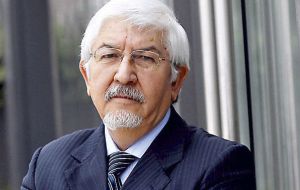MercoPress. South Atlantic News Agency
China and Chile agree to upgrade trade accord to take advantage of new technologies
 “From Chile's perspective, knowing China is our main trade partner, it generates good news in the lead up to the upcoming CELAC-China meeting,” said Rosales
“From Chile's perspective, knowing China is our main trade partner, it generates good news in the lead up to the upcoming CELAC-China meeting,” said Rosales China and Chile have agreed to upgrade their free trade agreement (FTA), a move that will boost both economies, a former official of the United Nations Economic Commission for Latin America and the Caribbean (ECLAC) said.
The two countries signed a protocol for upgrading bilateral FTA, aiming to boost trade in goods and services, on the sidelines of the latest economic leaders' meeting of the Asia-Pacific Economic Cooperation (APEC) forum held in Da Nang, Vietnam.
Osvaldo Rosales, former director of International Trade and Integration Division at ECLAC, said the event came at a favorable time when Chile is gearing up for hosting the second ministerial meeting under the framework of the China-CELAC Forum. (Community of Latin American and Caribbean States).
“It is a good step forward and from Chile's perspective, knowing China is our main trade partner, it generates good news in the lead up to the upcoming CELAC-China meeting,” said Rosales, who is an international consultant.
This will reinforce Chile's policy of opening up towards the world's major markets and strengthening economic and trade ties and cooperation with its leading trade partner, China, he said.
The move also coincided with a bilateral initiative to study the feasibility of laying an underwater fiber optic cable between China and Chile to facilitate communication with Latin America, he said.
“For Chile, it would represent an opportunity to become a digital supporter for e-commerce between South America and China and the Asia-Pacific,” said Rosales.
For both China and Chile, “promoting e-commerce signals that the two countries are entering the 21st century, taking advantage of the benefits of the new technologies to improve people's life quality,” he added.
China believes “this region has a very good medium for a long-term outlook, and as part of the region, Chile celebrates that development,” he said.
China and Chile share an interest in renewable energies, and mass transit alternatives are one area that's ripe for cooperation, Rosales noted.
“Electric mobility has tremendous potential for Chile, because we know building an electric car requires much more copper than building an internal combustion engine. To operate, it also needs lithium batteries and molybdenum, and it turns out our country has a lot to contribute when it comes to these three kinds of natural resources,” he said.
These Chilean products can be industrialized to generate value chains and attract foreign investment, and in some of these sectors, particularly lithium and solar energy, Chinese enterprises are interested, so there's a good outlook for future cooperation and investment, said Rosales.




Top Comments
Disclaimer & comment rulesCommenting for this story is now closed.
If you have a Facebook account, become a fan and comment on our Facebook Page!